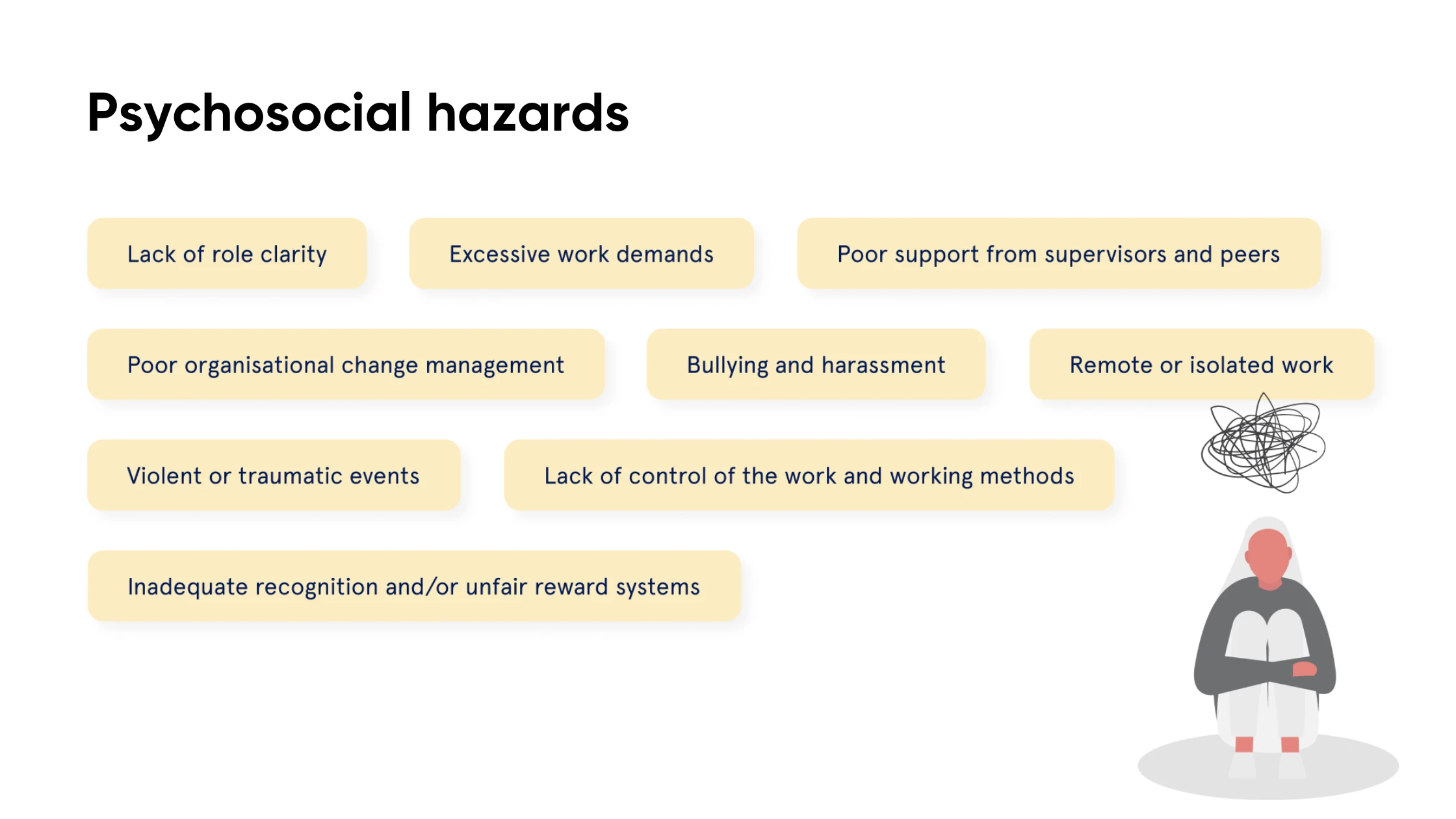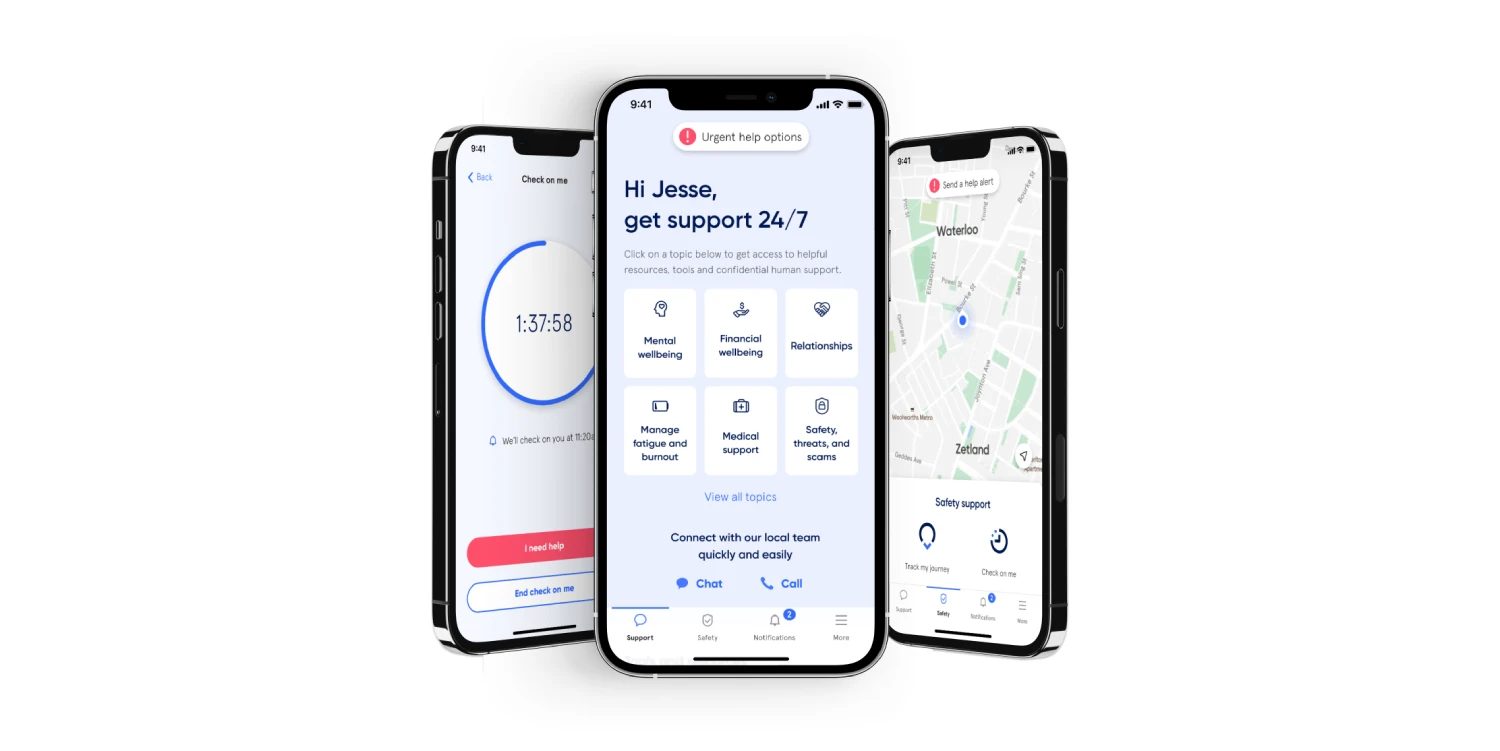The rise of remote work and increasing job demands are leaving many employees feeling isolated and struggling to set clear work-life boundaries. Our 2024 report revealed that 49% of employees in Australia and New Zealand experienced feelings of burnout and exhaustion in the past year.
Other psychosocial hazards, such as a lack of managerial support, limited mental health resources, and workplace bullying, are also negatively impacting many workers. But with the right evidence-based tactics, addressing and mitigating psychosocial risks is possible for every organisation.
Keep reading to hear from Sonder’s Co-Founder and COO, Peter Burnheim, alongside a line-up of P&C leaders, health and safety executives and industry experts to discover how to foster a safe, healthy workforce that proactively manages psychosocial risks.
Tip 1. Conduct regular psychosocial risk assessments
Psychosocial hazards (factors such as excessive work demands or bullying and harassment) have the potential to harm anyone in your team. Regular risk assessments are crucial to identifying what challenges your people may be facing.

By reviewing your work environment and employee data to identify which hazards are present in your organisation, regular psychosocial risk assessments allow you to take proactive steps to address potential issues before they escalate.
Not sure where to start? Our expert panel suggests employers consider the following:
- Use standardised tools and surveys: When identifying psychosocial hazards and assessing risks, it’s important to use validated assessment tools (such as the Corporate Mental Health Alliance Australia’s risk assessment resources and People at Work’s Australian psychosocial risk assessment survey) and employee surveys to gather comprehensive data.
- Engage employees in the process: Encourage open communication and feedback to involve employees in identifying hazards and assessing risks. By running anonymous surveys and explaining how these insights will be used, workers will be more likely to share honest feedback.
- Analyse and prioritise risks: Psychosocial hazards should be addressed urgently in the workplace to ensure risks are mitigated and don’t escalate further, causing greater consequences for both the employee and the wider company. Evaluate the assessment data to identify key risk areas and prioritise them based on the severity and likelihood of harm.
- Develop and implement action plans: Create practical, targeted action plans to address these risks and assign responsibility for implementation.
“Identify the factors, the impact on your workers, assign a level of risk so that you can prioritise your resources, implement controls to reduce the risk and evaluate to see if that works. Plus, make sure that this is a continuous process.”
Dr Tessa Bailey
Director and Registered Psychologist at the Opus Centre for Psychosocial Risk
Tip 2. Implementing effective controls to mitigate psychosocial risks
With your organisation’s key psychosocial hazards mapped out, it’s time to put controls in place to tackle the root causes of these challenges.
The exact actions and steps that you need to take will depend on what psychosocial hazards are impacting your team, from lack of role clarity to encountering customer aggression, or a poor physical working environment.
So, what does this look like in practical terms? Let’s explore a few key steps you can take to control psychosocial hazards and mitigate associated risks in the workplace:
- Improve job design: Are employees clear on their key responsibilities? How manageable are your team’s workloads, and what are you doing to address resourcing issues? By offering a clear answer to these questions, you’ll ensure your team has role clarity, greater job control, and a manageable workload.
- Enhance leadership training: Our Psychosocial Workforce Report found that poor leadership support had the largest impact on employees’ output and performance. Leaders should receive support and training to upskill in areas like conflict resolution, communication skills, and emotional intelligence to be better placed to spot and manage psychosocial risks at work.
- Promote work-life balance: Flexible working arrangements (including hybrid work arrangements and flexible start and finish times) can empower employees to foster healthy work-life balance and cultivate daily habits that enable them to deliver their best work.
- Implement anti-bullying policies: Create and enforce strict anti-bullying and harassment policies, along with procedures for reporting and addressing incidents.
- Foster a supportive environment: Establish support systems, including peer support programs and mentoring, and ensure mental health and wellbeing resources are available for employees at all times. For example, with Sonder’s app, employees have personalised support available 24/7, including self-serve resources, safety support, and medical advice.
Tip 3. Foster a culture of care and psychological safety
Many employees impacted by psychosocial hazards do not feel comfortable voicing concerns and feel isolated—both of which are key to psychological safety at work.
Our report backs this up, finding that 85% of those who experienced poor managerial support felt their concerns were not adequately addressed, despite telling their workplace.
Creating a culture of care is invaluable as it ensures employees feel valued and supported in their roles. To boost psychological safety at work, consider the following:
- Implement regular check-ins: Leaders and managers should frequently schedule one-on-one and team meetings in which employees can discuss workloads, challenges, and wellbeing.
- Promote inclusivity and respect: Though it may sound straightforward, it’s important to ensure all employees feel included, valued, and respected by fostering diversity and preventing discrimination and harassment. Clear diversity, equity, and inclusion policies should address these issues in hiring practices, promotion opportunities, and workplace conduct.
- Recognise and reward positive behaviour: Employers can recognise and reward behaviours that contribute to a supportive and caring workplace environment, such as celebrating a colleague who checks in on their peers.
“As leaders, our leadership style can be preventative and protective in identifying psychosocial risks. It’s about considering what are those behaviours that we can be implementing as leaders on a consistent basis to ensure our leadership style is being protective of psychosocial injury in the workplace.”
Mark Oostergo
Chief Executive at Australian Psychological Services
Tip 4. Encourage open communication and cross-team collaboration to tackle psychosocial risks
Misunderstandings, conflicts, and feelings of neglect are common for those exposed to psychosocial hazards in the workplace. But fostering open communication in the workplace promotes transparency and trust and ensures a supportive, productive workplace.
To foster open communication and care, employers can implement the following strategies:
- Train leaders in active listening: Provide training for managers on active listening skills to ensure they fully understand and are equipped to address the concerns of employees in a caring and supportive manner.
- Promote transparent communication: Psychosocial risks also stem from poor workplace change management, so it’s important to provide transparent communication about company policies and decisions—ensuring employees know what is changing and why.
- Establish supportive policies: Policies should be developed with the intention of promoting work-life balance, offering proactive mental health support, and fostering respectful interactions between employees at all levels.
- Recognise and address conflicts early: Perhaps most importantly, when it comes to addressing conflicts, the resolution process should be one that prioritises early intervention so the issues can be resolved before escalating.
Amanda Clements, Group HSE Manager, Strategy and Wellbeing at Mirvac, explains that Mirvac takes a multi-pronged approach to mitigating psychosocial risk, with strategies grounded in open communication.
“We have a planned approach to dynamic risk assessment. That revolves around leveraging what we already have (an engagement survey) and taking steps to enhance this with more questions and additional data, such as exit surveys and financial data. There’s so much going on across the organisation that can provide a clearer picture of what’s going on,” says Clements.
“Importantly though, we’re very responsive. We respond to risks that emerge… and we’re able to work with our team and identify key emerging risks to take action quickly.”
Tip 5. Continually review the effectiveness of risk controls
Here’s what many leaders overlook: psychosocial risks can emerge at any time.
That’s why it’s important to monitor the workplace regularly for ongoing stressors and emerging hazards. This strategy allows employers to evaluate how well current risk controls are working and whether these need to be adjusted to meet employees’ evolving needs.
When it comes to regular monitoring and evaluation for risk control, here’s where to start:
- Continually gather employee feedback: From surveys and focus groups to feedback sessions, gathering insights from employees about their experiences and concerns is an effective way to evaluate the effectiveness of risk control strategies and identify new hazards.
- Analyse data and trends: By using digital employee health, safety, and wellbeing tools, you can gain real-time insights into what kinds of support employees are accessing, how effectively teams are utilising these resources and pinpoint trends that can inform how you continually improve your company culture and support systems.
- Report findings and actions: The results of evaluations and steps taken to address risks should be communicated clearly to all employees, managers, and leaders, ensuring transparency and accountability within the workplace.
Research has found that involving workers in identifying psychosocial hazards and the redesign process can result in improvements over and above simply implementing control measures. By redesigning work to effectively reduce job demands and tailor support to the needs of employees, individual performance, job satisfaction, and overall business performance can be greatly enhanced.
Free download: Our guide to Navigating Psychosocial Risk Management
Discover how to leverage regulations and standards to your advantage as you navigate the complexities of employee wellbeing with our guide, in partnership with Australian Psychological Services.
This new guide includes:
- How to identify and manage psychosocial hazards in the workplace.
- The latest regulatory requirements in Australia and New Zealand.
- Practical steps to support employee wellbeing and ensure compliance.

How Sonder can help
As the strategies above reveal, it’s important to take a proactive approach to understanding and mitigating psychosocial risks in the workplace. By having robust processes and practices in place, employers can be sure that employees feel supported, boosting engagement, inspiring retention, and even driving an uptick in productivity and output.

24/7 medical, safety and mental health support
Sonder is a workforce health and safety platform that provides the right care at the right time for personal safety, medical, and mental health needs. The Sonder app offers 24/7 immediate connection to expert support via chat or call, personal safety tools like smart check-ins and journey tracking, and access to wellbeing resources such as personal assessments and self-care content.
For more information about how Sonder can help you reduce people related risks and costs, ensure compliance, and build a resilient, productive workforce, contact us here.
About Sonder
Sonder is a technology company that helps organisations improve the wellbeing of their people so they perform at their best. Our mobile app provides immediate, 24/7 support from a team of safety, medical, and mental health professionals – plus onsite help for time-sensitive scenarios. Accredited by the Australian Council on Healthcare Standards (ACHS), our platform gives leaders the insights they need to act on tomorrow’s wellbeing challenges today.



